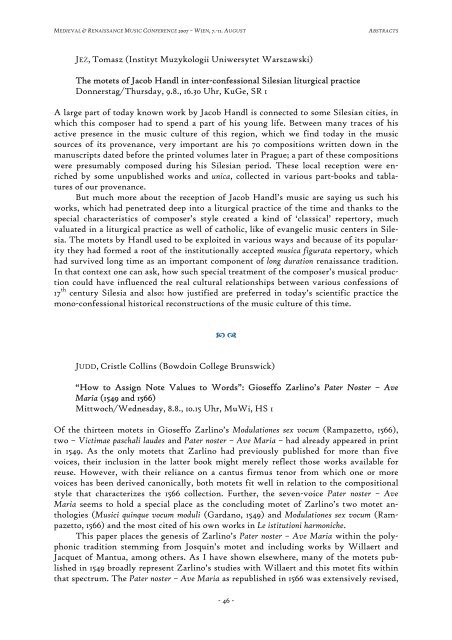(Stand: 25. Juli 2007) ANDERSON, Michael Alan ... - Universität Wien
(Stand: 25. Juli 2007) ANDERSON, Michael Alan ... - Universität Wien
(Stand: 25. Juli 2007) ANDERSON, Michael Alan ... - Universität Wien
Create successful ePaper yourself
Turn your PDF publications into a flip-book with our unique Google optimized e-Paper software.
MEDIEVAL & RENAISSANCE MUSIC CONFERENCE <strong>2007</strong> – WIEN, 7.-11. AUGUST ABSTRACTS<br />
JEŻ, Tomasz (Instityt Muzykologii Uniwersytet Warszawski)<br />
The motets of Jacob Handl in inter-confessional Silesian liturgical practice<br />
Donnerstag/Thursday, 9.8., 16.30 Uhr, KuGe, SR 1<br />
A large part of today known work by Jacob Handl is connected to some Silesian cities, in<br />
which this composer had to spend a part of his young life. Between many traces of his<br />
active presence in the music culture of this region, which we find today in the music<br />
sources of its provenance, very important are his 70 compositions written down in the<br />
manuscripts dated before the printed volumes later in Prague; a part of these compositions<br />
were presumably composed during his Silesian period. These local reception were enriched<br />
by some unpublished works and unica, collected in various part-books and tablatures<br />
of our provenance.<br />
But much more about the reception of Jacob Handl’s music are saying us such his<br />
works, which had penetrated deep into a liturgical practice of the time and thanks to the<br />
special characteristics of composer’s style created a kind of ‘classical’ repertory, much<br />
valuated in a liturgical practice as well of catholic, like of evangelic music centers in Silesia.<br />
The motets by Handl used to be exploited in various ways and because of its popularity<br />
they had formed a root of the institutionally accepted musica figurata repertory, which<br />
had survived long time as an important component of long duration renaissance tradition.<br />
In that context one can ask, how such special treatment of the composer’s musical production<br />
could have influenced the real cultural relationships between various confessions of<br />
17 th century Silesia and also: how justified are preferred in today’s scientific practice the<br />
mono-confessional historical reconstructions of the music culture of this time.<br />
� �<br />
JUDD, Cristle Collins (Bowdoin College Brunswick)<br />
“How to Assign Note Values to Words”: Gioseffo Zarlino’s Pater Noster – Ave<br />
Maria (1549 and 1566)<br />
Mittwoch/Wednesday, 8.8., 10.15 Uhr, MuWi, HS 1<br />
Of the thirteen motets in Gioseffo Zarlino’s Modulationes sex vocum (Rampazetto, 1566),<br />
two – Victimae paschali laudes and Pater noster – Ave Maria – had already appeared in print<br />
in 1549. As the only motets that Zarlino had previously published for more than five<br />
voices, their inclusion in the latter book might merely reflect those works available for<br />
reuse. However, with their reliance on a cantus firmus tenor from which one or more<br />
voices has been derived canonically, both motets fit well in relation to the compositional<br />
style that characterizes the 1566 collection. Further, the seven-voice Pater noster – Ave<br />
Maria seems to hold a special place as the concluding motet of Zarlino’s two motet anthologies<br />
(Musici quinque vocum moduli (Gardano, 1549) and Modulationes sex vocum (Rampazetto,<br />
1566) and the most cited of his own works in Le istitutioni harmoniche.<br />
This paper places the genesis of Zarlino’s Pater noster – Ave Maria within the polyphonic<br />
tradition stemming from Josquin’s motet and including works by Willaert and<br />
Jacquet of Mantua, among others. As I have shown elsewhere, many of the motets published<br />
in 1549 broadly represent Zarlino’s studies with Willaert and this motet fits within<br />
that spectrum. The Pater noster – Ave Maria as republished in 1566 was extensively revised,<br />
- 46 -
















